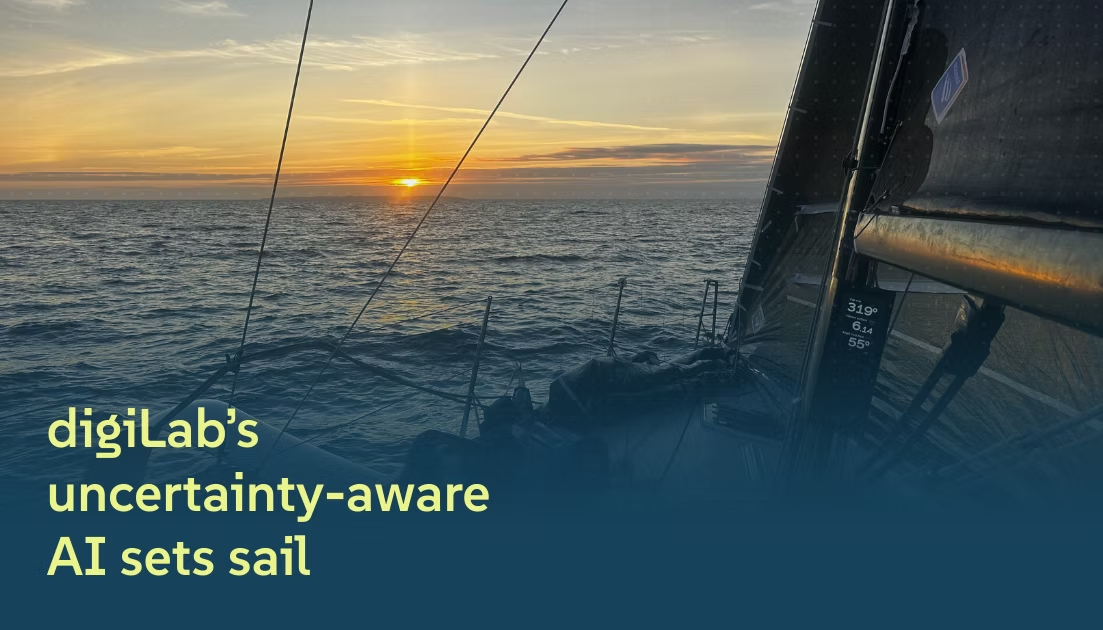From Elite Racing to Greener Shipping: digiLab’s Uncertainty-aware AI sets Sail
13 Aug 2025

This summer, offshore sailing becomes a proving ground for next-generation AI, as leading AI company digiLab partners with sailors Joss Creswell and Charlie Warhurst.
UK AI experts digiLab partner with Next Step Racing to explore the use of uncertainty-aware machine learning in offshore sailing
The system models expected boat performance and flags real-time deviations to help sailors optimise trim and strategy
The project aims to inform future applications in commercial shipping, route planning, and maritime sustainability
This summer, offshore sailing becomes a proving ground for next-generation AI, as leading AI company digiLab partners with sailors Joss Creswell and Charlie Warhurst. Together, they’re deploying uncertainty-aware machine learning in one of the most unpredictable environments on Earth: the open ocean.
This collaboration fuses elite sailing with world-class AI expertise - with benefits that extend far beyond the finish line, into commercial shipping, route optimisation, and maritime decarbonisation.
The first challenge? Optimising performance in the 2025 Défi Paprec, a rigorous offshore race from Rouen to Roscoff sailed in one-design Figaro Bénéteau 3 foiling yachts - high-performance boats that partially lift out of the sea at speed, especially when surfing, setting them apart from conventional offshore race craft.
Unlike conventional AI that offers a single prediction, uncertainty-aware AI also measures how confident it is - a crucial advantage in the unpredictable conditions of ocean racing. By flagging deviations from expected performance and indicating confidence levels, the system helps sailors focus on what matters most in high-variance situations.
At the heart of the project is digiLab’s platform, The Uncertainty Engine, which uses probabilistic machine learning to model how the boat is likely to behave across varying wind and sea conditions - and how sure those predictions are. This insight guides sail trim, setup, and strategy, not replacing the human helm but sharpening it.
Prof. Tim Dodwell, CEO and Founder of digiLab comments on the innovative partnership: "We’re not trying to take the helm away from the sailors, we’re giving them an extra layer of feedback - grounded in data, but aware of its limits.
“What’s exciting about this project is that it brings cutting-edge probabilistic AI into one of the most dynamic, high-variance environments imaginable. Offshore sailing is fast-moving and full of edge cases - making it the ideal setting to explore how decision-support systems perform under real pressure. It’s a rare opportunity to move this kind of tech out of simulation and into the real world."
The racing partnership is also a testbed for future applications in commercial shipping. Even modest performance gains matter: a 5% improvement in fuel efficiency could save 0.6 million tonnes of CO₂ annually in the UK - equivalent to taking 300,000 petrol cars off the road.
Joss Creswell, co-skipper (with Charlie Warhurst) of Next Step Racing, said, "It’s brilliant to be partnering with digiLab. We’re a young team and very excited to partner with an innovative and data driven company to push the limits of the sport and our understanding of weather routing.
Offshore racing is very strategic, like chess, but it exists in a chaotic environment where uncertainty is everywhere. This is where we feel digiLab can make a difference and help us get to the standard of the more experienced sailors quicker.
“This system doesn’t replace our instincts, it helps sharpen them during training. When you’re out there, running on adrenaline and a few hours’ sleep, having a system that flags anomalies and asks the right questions is a game-changer in terms of better understanding the weather routing software. It’ll help us make smarter decisions, stay sharper for longer, and ultimately race better. And if that same technology can help commercial shipping become more sustainable? That’s massive, because it means our racing and partnership is having an impact well outside the boundaries of the race course.”
Looking ahead, the team plans to expand into route optimisation under uncertainty, integrating weather forecasts and using advanced algorithms to explore tactical trade-offs. There are also ambitions to trial real-time decision-support interfaces for both high-performance sport and commercial marine operations.
By embracing uncertainty - rather than ignoring it - digiLab and Next Step Racing are charting a course toward more adaptive, energy-aware systems across the maritime sector. With decarbonisation high on the global agenda, it’s a small but significant step toward more intelligent, lower-impact shipping, powered by world-leading AI expertise.